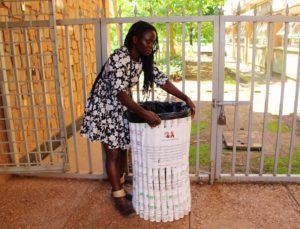Barbara Kemigisa raises HIV awareness through making artefacts of ARV pill bottles
Barbara Kemigisa was sexually defiled by her uncles for years. Her traumatic experience made her become promiscuous. She later got pregnant and also contracted the dreaded HIV.
But that is not the end of her story. Barbara Kemigisa now uses her life story to empower youths and teach them how to live well. She makes bins from ARV bottles so as to raise awareness about HIV/AIDS in Uganda.
Barbara Kemigisa lived with her mother from birth, but when she was three years old; her father took her to live with her paternal grandmother in Fort Portal. Her grandmother loved her a lot.
But she didn’t know that danger was lurking in the corner. When she was five years old, her uncle who was in his early 20s, started defiling her. He would make her lie on a bench in one of the empty houses and have sex with her.
Kemigisa’s uncle would give her money to buy sweets and order her not to tell anyone about the ordeal. He defiled her over and over again and kept giving her sweets and money to cover up his misdeeds.
The worst thing was that one year later, another uncle started defiling Barbara Kemigisa. Both men were defiling her at the same time, although they did not know it.
In a strange twist, after being repeatedly defiled, Kemigisa became promiscuous. By her 11th birthday, she had many boyfriends.
She joined St. Joseph’s Nsambya in Kampala for her secondary education, but was expelled shortly after for being rebellious.
Kemigisa was then taken to Kibito Secondary School in Appendicitis. She slept with a countless number of boys and was called the school’s slut.
In A’level, she joined Mbogo Mixed School, where she set out to change her life. She became a born-again Christian, a decision that displeased her father so much that he disowned her.

Barbara got intimate with a man and two months later, she was pregnant. Shortly after that, she discovered that her boyfriend had another girlfriend and they had a baby. Once again she got depressed, fell ill and her aunt advised her to take an HIV test.
“I was HIV-positive, two months pregnant and with no boyfriend,” Barbara recalls. Her boyfriend was HIV-negative, which implied that she had got infected at the peak of her sexual addiction.
Her daughter Kourtney was born HIV negative, but she couldn’t afford formula. She tried everything, even putting her up for adoption, but all failed and she was forced to breastfeed her. When her daughter was six months old, tests showed that she too was HIV-positive.
When Kemigisa broke the news about hers and her daughter’s HIV status to her parents, her father’s response was “Who told you I am your father?” Fortunately, her mother was supportive and they have since grown close.
To provide for her child, Kemigisa started making jewellery, which doesn’t bring in much, but puts food on her table. Today, she and her daughter support each other.
In a world full of stigma for HIV positive people, Barbara Kemigisa teaches her daughter to be strong, smile, but above all, to love herself.
Today, Kemigisa talks to youths at gatherings, but she is saddened seeing the youth leading reckless lives and discriminating against their peers who are HIV-positive.
Kemigisa believes that all teenage rebellions are as a result of pain and she advises them to talk to someone.
If only she had talked to her grandmother about being sexually abused by her uncles, her life would have been different.
Kemigsa says she is open about her HIV status because she wants to live a free life and her art also gives her a sense of purpose.
She and her daughter are both taking ARVs as they try to give hope to other young people struggling with different challenges, trying to accept who they are so that they can be able to cope with life.
Stigma amongst people with HIV & AIDS is one of the biggest hindrances to treatment amongst people living with the disease, Barbara Kemigisa, came up with an effective method of reaching out to people living with HIV and the general public.
Kemigisa who is also an employee of Makerere University Business school in Nakawa has been doing awareness and advocacy work for years. She has adopted novelty to carry out her work by making artefacts and common pieces of household furniture from ARV pill bottles.
Kemigisa’s handiwork is not only practical but it also aims to raise HIV awareness through the messages that are inscribed all over the finished pieces of art.
Some of her rubbish bins that are placed at different places attract attention because of their unique looks but people soon realise that there is a deeper message written on the bins.
Kemigisa says once her initiative improves, it will help improve communication between people living with HIV and AIDS. She intends to spread a message of adherence to treatment which improves the health of HIV positive persons in Uganda and Africa as a whole.
